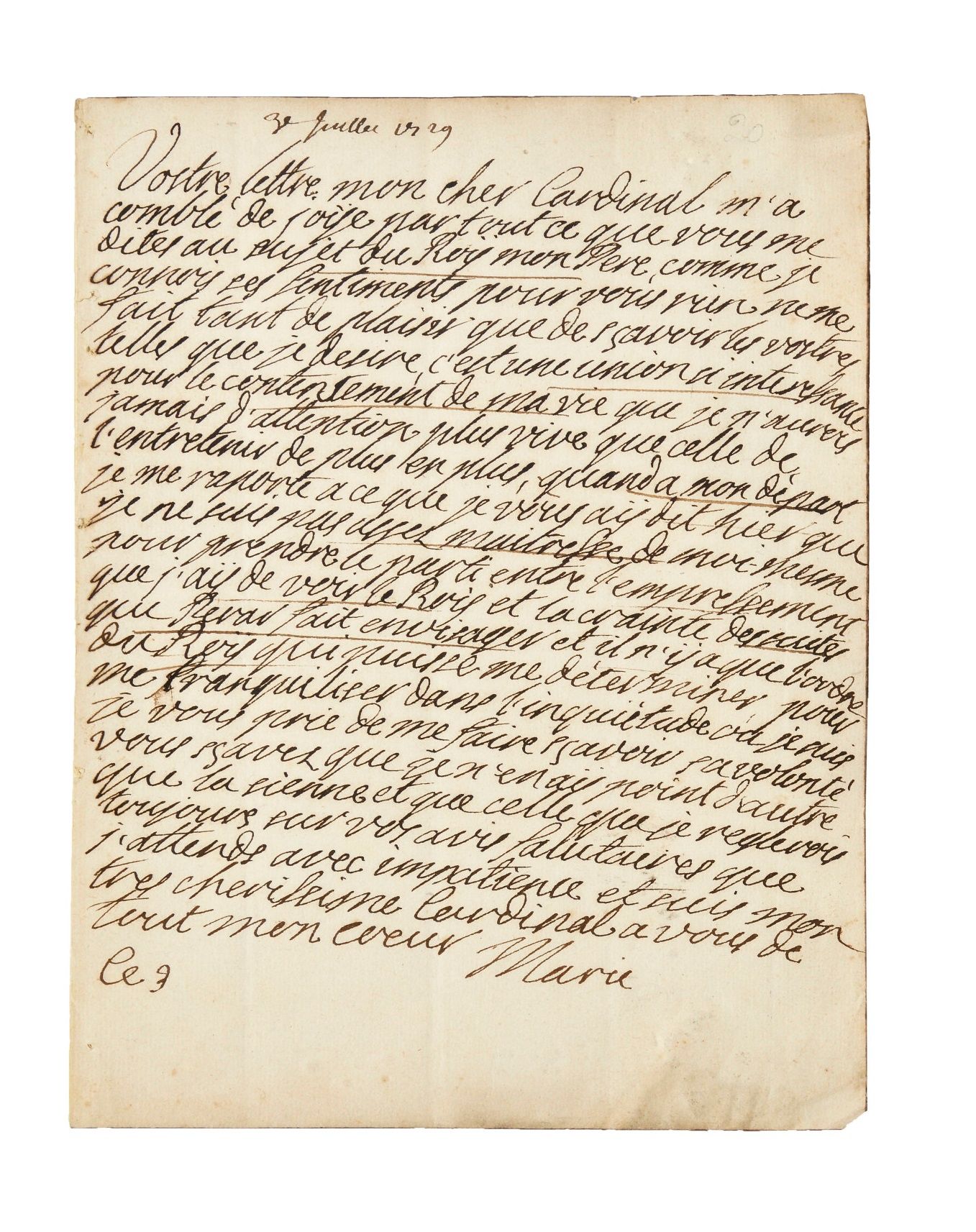Description
LESZCZYNSKA (Marie). Autograph letter signed "Marie" to principal minister André-Hercule de Fleury. S.l., "ce 3" [July 3, 1729, according to an early notation in ink by another hand]. One p. in-4, address on spine with 2 armorial black wax seals retained. 600/800 "YOUR LETTER, MY DEAR CARDINAL, HAS FILLED ME WITH JOY BY EVERYTHING YOU TELL ME ABOUT THE KING MY FATHER [STANISLAS LESZCZYNSKI]. As I know his feelings for you, nothing pleases me more than to know that yours are as I desire. It is an interesting union for the contentment of my life, that I would never have a more lively attention than that of maintaining it more and more. Quan[t] à mon départ, je raporte à ce que je vous ai dit hier que je ne suis pas assez maîtresse de moi-même pour prendre le parti entre l'empressement que j'ay de voir le roy et la crainte des suites [peut-être une allusion à son état de grossesse, alors qu'elle donneait naissance à un fils le 4 septembre 1729]... et il n'y a que l'ordre du roy qui puisse déterminer me pour me tranquiliser dans l'inquiétude où je suis. Please let me know his will. You know that I have none other than his, and that I will always act on your salutary advice, which I await with impatience and am, my most cherished Cardinal, yours with all my heart...". CARDINAL FLEURY, ONE OF THE GREAT STATE MEN OF THE 18th CENTURY. Hercule-André de Fleury (1653-1713) was very pious, but no less well-versed in worldly affairs. He became chaplain to Queen Marie-Thérèse, then quarterly chaplain to the King, and accompanied Cardinal Forbin-Janson on his mission to Rome in 1690. In 1698, he obtained the bishopric of Fréjus, which he did not win until 1701, but where he proved to be an apostolic bishop close to the people. He always worked for peace, notably in 1707 during the War of the Spanish Succession, when he welcomed Victor-Amédée of Savoy and Prince Eugène, who had come to lay siege to Toulon, to his bishopric. His attitude made an impression, and he was offered an archbishopric, which he refused; he even renounced his see of Fréjus and returned to Versailles, where he was given the title of tutor to the future Louis XV. He won the latter's confidence, and in 1726 was appointed principal minister (the same year the Pope made him a cardinal): he pursued a policy of appeasement on all fronts - internal, external and religious.
45
LESZCZYNSKA (Marie). Autograph letter signed "Marie" to principal minister André-Hercule de Fleury. S.l., "ce 3" [July 3, 1729, according to an early notation in ink by another hand]. One p. in-4, address on spine with 2 armorial black wax seals retained. 600/800 "YOUR LETTER, MY DEAR CARDINAL, HAS FILLED ME WITH JOY BY EVERYTHING YOU TELL ME ABOUT THE KING MY FATHER [STANISLAS LESZCZYNSKI]. As I know his feelings for you, nothing pleases me more than to know that yours are as I desire. It is an interesting union for the contentment of my life, that I would never have a more lively attention than that of maintaining it more and more. Quan[t] à mon départ, je raporte à ce que je vous ai dit hier que je ne suis pas assez maîtresse de moi-même pour prendre le parti entre l'empressement que j'ay de voir le roy et la crainte des suites [peut-être une allusion à son état de grossesse, alors qu'elle donneait naissance à un fils le 4 septembre 1729]... et il n'y a que l'ordre du roy qui puisse déterminer me pour me tranquiliser dans l'inquiétude où je suis. Please let me know his will. You know that I have none other than his, and that I will always act on your salutary advice, which I await with impatience and am, my most cherished Cardinal, yours with all my heart...". CARDINAL FLEURY, ONE OF THE GREAT STATE MEN OF THE 18th CENTURY. Hercule-André de Fleury (1653-1713) was very pious, but no less well-versed in worldly affairs. He became chaplain to Queen Marie-Thérèse, then quarterly chaplain to the King, and accompanied Cardinal Forbin-Janson on his mission to Rome in 1690. In 1698, he obtained the bishopric of Fréjus, which he did not win until 1701, but where he proved to be an apostolic bishop close to the people. He always worked for peace, notably in 1707 during the War of the Spanish Succession, when he welcomed Victor-Amédée of Savoy and Prince Eugène, who had come to lay siege to Toulon, to his bishopric. His attitude made an impression, and he was offered an archbishopric, which he refused; he even renounced his see of Fréjus and returned to Versailles, where he was given the title of tutor to the future Louis XV. He won the latter's confidence, and in 1726 was appointed principal minister (the same year the Pope made him a cardinal): he pursued a policy of appeasement on all fronts - internal, external and religious.
